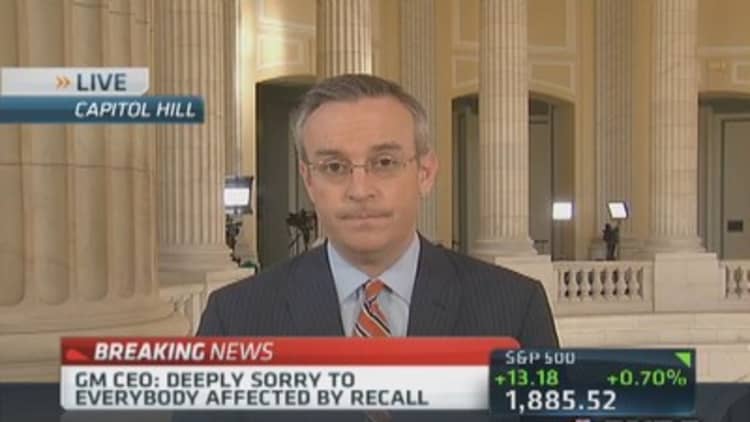It's clear the regulatory system failed millions of owners of General Motors vehicles with faulty ignition switches. Those defective switches are now blamed for at least 13 deaths.
Why didn't GM recall vehicles with faulty ignition switches as soon as it knew about the problem? Why didn't the National Highway Traffic Safety Administration order a recall years ago?
At a congressional hearing on Tuesday, David Freidman, acting administrator of NHTSA, told a House subcommittee that his agency was "engaged and concerned" about the injury crash complaints it received and tried to figure out why the airbags did not deploy. But he said the Chevy Cobalt "did not stand out," so an investigation was never started.
Freidman said the agency's response would have been different if the automakers had provided information sooner. And he told lawmakers that NHTSA is already making changes that will allow it to spot dangerous defects more quickly.
Read MoreGM's Barra: We're sorry about the recall, we'll fix the problem
Members of Congress have already proposed legislation to improve federal oversight.
The Early Warning Reporting System Improvement Act, co-sponsored by Sen. Edward Markey, D-Mass., and Sen. Richard Blumenthal, D-Conn., would require vehicle and equipment manufacturers to submit any reports that first alert them to a fatal accident involving their vehicle or equipment.
The bill would also require NHTSA to make this information publicly available in a searchable, user-friendly format. This would make it easier for car owners and independent safety experts to evaluate potential safety defects themselves.

"A massive information breakdown at NHTSA has led to deadly vehicle breakdowns on our roads," Markey said in a statement. "The Department of Transportation has the authority to require critical safety information be made publicly available, but it has never used its authority."
"NHTSA's job should be to make life-saving information available, not more difficult to access," Blumenthal said in a statement. "This up-to-date, accessible database will be a vital tool for drivers and consumer advocates in preventing future harm."
The bill, S. 2151, is expected to be discussed at a Senate subcommittee hearing on Wednesday.
Clarence Ditlow, executive director of the nonprofit Center for Auto Safety, a harsh critic of NHTSA and the auto industry, believes the new legislation is much needed.
Read MoreGM's Barra to Congress: We called in Ken Feinberg
"Automakers run millions of defective vehicles through loopholes in the current reporting system," Ditlow said. "This would change the culture at NHTSA to make it transparent to the public. And it would require the automakers to do what's right when it comes to public safety."
—By CNBC contributor Herb Weisbaum. Follow him on Facebook and Twitter @TheConsumerman or visit The ConsumerMan website.

